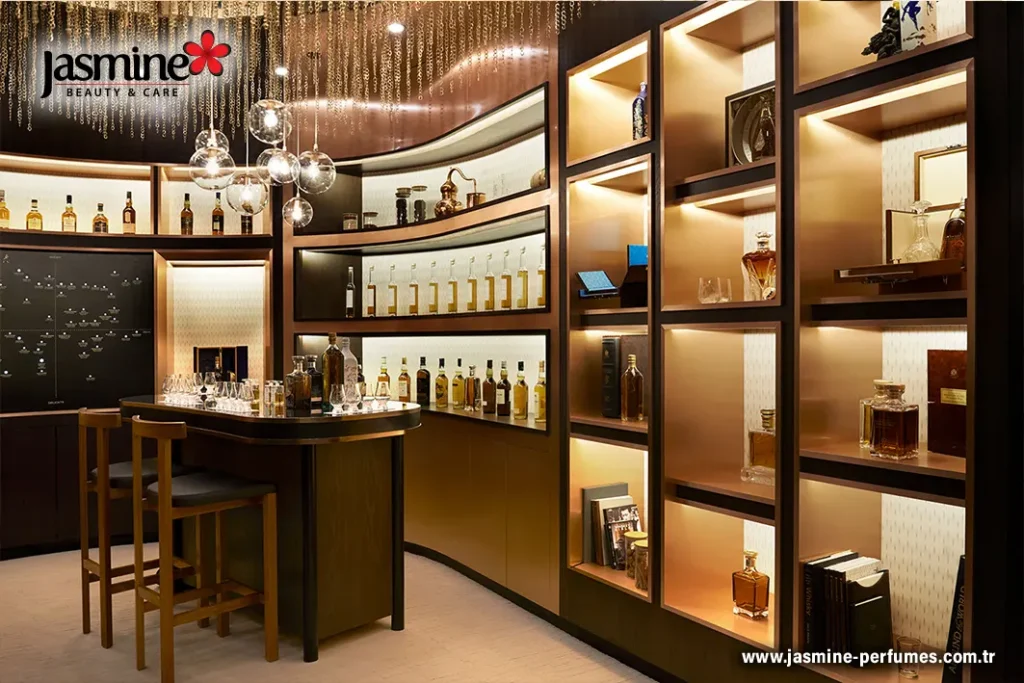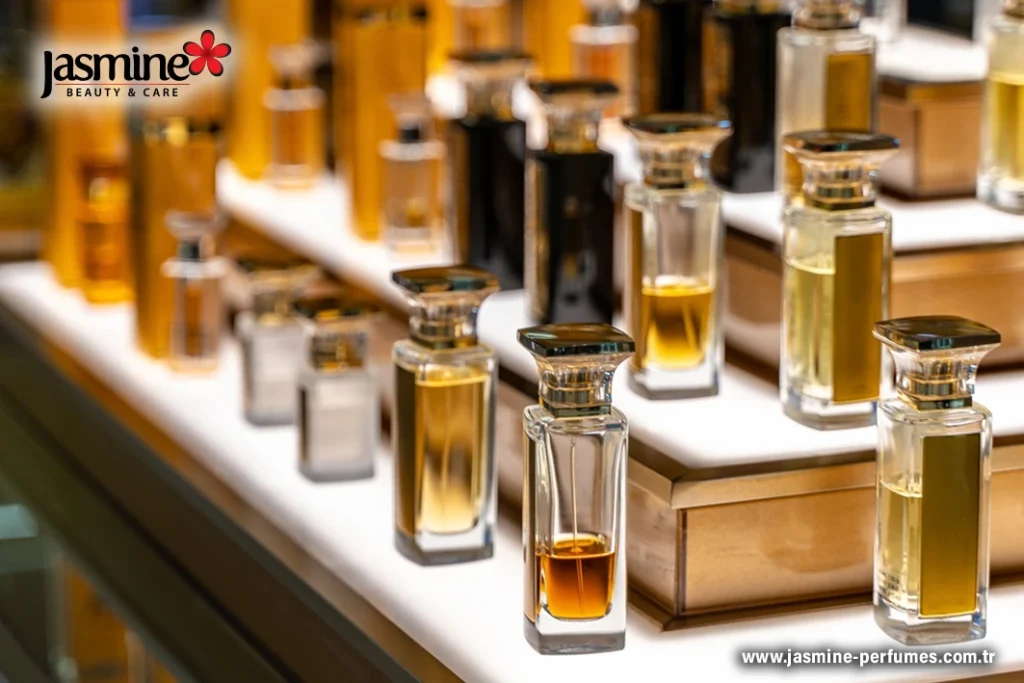If you dream of owning a successful business that generates income and exudes elegance, opening a perfume shop is definitely worth considering as your top idea for 2025. However, with the evolving perfume market and changing consumer preferences, conducting a feasibility study for your perfume business has become a crucial necessity to ensure success and sustainability.
In this article, we will guide you on how to create a practical and simple perfume business feasibility study, focusing on the essential points you’ll need for this task. Whether you’re a beginner in the business world or have previous experience, you’ll find everything you need with Jasmine Perfumes to turn your fragrant dream into a profitable reality.
Get ready, grab a pen and paper, and a cup of coffee, and let’s dive in…
Why Should You Start a Perfume Business in 2025?
In 2025, opening a perfume shop is a successful investment for several reasons that you should consider:
- Growing Demand for Perfumes: With the increasing awareness of personal care and boosting self-confidence, people are considering perfume as an essential part of their daily routine.
- Advancements in the Perfume Industry: The perfume industry has witnessed significant developments in manufacturing, packaging, and bottling techniques, creating opportunities for investors to introduce innovative and unique products that capture customers’ attention.
- Opportunity to Target Various Market Segments: By offering a diverse range of perfumes, from luxury and imported brands to more affordable local options, a perfume shop has the potential to attract a wide variety of customers with different budgets, creating a larger and more inclusive customer base.
- The Growth of E-commerce Platforms: The widespread expansion of e-commerce platforms enables perfume shops to take advantage of the significant growth in online shopping, extending their reach and boosting sales, especially as consumers increasingly prefer shopping online.
- Innovation in Marketing: With innovative marketing strategies such as promotional offers and collaborations with influencers in the beauty and fashion industry, perfume shops can achieve significant differentiation and build a loyal customer base.
Now, let’s continue with the steps for creating a feasibility study for your perfume business…
Also read: Jasmine Fragrances and Fresheners: Best Fragrance Brand in Turkey

Elements of Perfume Business Feasibility Study Report
Market Research and Demand Analysis
Market research and demand analysis are essential steps in preparing a feasibility study for your perfume shop, and they include:
- Identifying the Target Audience: Understand who your primary customers are, including factors like gender, age, preferences, and other influencing variables.
- Measuring Market Size: Collect data on the size of the perfume market and the growth rates in your target market.
- Analyzing Competitors: Identify the key competitors in the market, understand their strategies, and determine ways to differentiate your brand from them.
- Monitoring Trends: Stay updated on current trends in the perfume industry and how they influence consumer buying decisions.
- Pricing: Determine the appropriate price range for your target audience based on competitor analysis, market demand, and customer expectations.
- External Factors: Take into account external factors such as economic, political, and cultural conditions that might impact the perfume market in your target area.
ِAlso Read: Perfume Market Size in the Arab World: Real Statistics & Figures 2024
Defining the Idea and Initial Planning
When defining the idea and starting the initial planning phase in the perfume business feasibility study, several key elements must be considered. These elements will form the foundation for all subsequent steps in the feasibility study and project preparation. Proper planning at this stage ensures that solid foundations are laid for the business, which can help avoid many potential challenges and issues in the future.
Here is the structure of the initial planning:
Clarifying the Vision and Objectives
- Define what makes your business unique: This could include offering rare perfumes, locally made scents, or luxury fragrances.
- Set clear and measurable goals for what you aim to achieve in the first months or years of operation.
Initial Planning
- Market Research: Understand the market needs and preferences of your target audience.
- Financing: Estimate how you will fund the project, whether through personal savings, a bank loan, or investment partners.
- Human Resources: Plan the type and number of team members required to operate the shop effectively.
- Technology and Tools: Identify the necessary tools and technology for running the shop, such as inventory management and point-of-sale systems.
Timeline
- Develop an initial timeline for each stage of the project, starting from planning to the official opening.
Cost Analysis with Investment
In the financial feasibility study phase for a perfume shop, it is crucial to determine all expected expenses to ensure sound financial planning. Accurately identifying these costs helps in creating a comprehensive financial plan and evaluating the total investment needed to successfully launch and operate the perfume shop.
The expenses typically include:
Setup Costs
- Store Setup: Includes interior furnishings, decoration, and display equipment.
- Initial Inventory: Purchasing the perfumes that will be available for sale.
- Technology and Software: Buying point-of-sale systems and inventory management software.
Fixed Operating Costs
- Rent: The cost of leasing the store location.
- Salaries: Wages for employees and administrative staff.
- Utilities: Costs for electricity, water, internet, and other services.
Marketing Costs
- Advertising Campaigns: Costs related to both digital and traditional marketing and advertising.
- Public Relations and Promotion: Costs for promotional events and collaboration with influencers.
Contingency Capital
- Set aside an amount for unexpected circumstances and market fluctuations.
Location Select and Store Setup
Choosing the right location for your perfume shop is a critical factor in determining the success of the business and falls under the technical feasibility study of the perfume shop. The location should consider the following factors:
- High Foot Traffic: The store should be situated in a high-traffic area where your target customers frequent.
- Easy Accessibility and Sufficient Amenities: The location should be easily accessible, with sufficient customer amenities.
After selecting the location, the next step is setting up the store, which should:
- Reflect the Quality and Luxury of the Products: The interior decor should be designed to be visually appealing and elegant.
- Provide Sufficient Space for Customers: Ensure the store has enough space for customers to comfortably experience the perfumes.
Marketing and Sales Strategy
Marketing and sales strategy are essential components for the success of a perfume shop. Through these, you, as the shop owner, can attract customers and increase sales. However, a successful sales strategy relies on combining the following elements:
- Defining the Marketing Message: Highlight the uniqueness of the products offered by the store. This message should be reflected in all marketing materials and customer touchpoints.
- Investing in Digital Marketing: This is crucial, especially in the modern era. You can create targeted online campaigns aimed at specific audiences based on their interests and behaviors using platforms like Instagram and Facebook. Alternatively, developing an online store allows customers to make purchases remotely, expanding your reach beyond the local area.
- Promotions and Seasonal Discounts: These are key to attracting customers and increasing sales, especially during holidays and special events.
- Building Relationships with Influencers: Collaborating with influencers in the perfume industry allows you to reach a broader audience and build customer trust.
Also Read: Best Strategies to Sell Perfumes in the Markets for 2025
Revenue and Profitability Analysis
Revenue and profitability analysis reflects the potential financial success of a perfume shop business. This analysis requires an understanding of expected revenues and the costs associated with the project, which is essential for ensuring the sustainability of the business and achieving its objectives.
To analyze revenue and profitability, you need to consider the following:
- Expected Revenue: Estimate monthly or yearly sales based on market size and the projected market share for your business.
- Direct and Indirect Costs: These include costs related to perfumes, rent, salaries, marketing, and other operational expenses.
- Break-Even Point: This is the point where revenues equal costs, helping you understand when the business will begin to turn a profit.
- Profit Margin: Calculate the difference between the selling price and the cost of perfumes to estimate the net profit for each unit sold.
Licenses and Legal Procedures
Obtaining the necessary licenses and following legal procedures is essential for establishing a perfume shop legally. This includes:
- Business Registration: Register the business as an official commercial entity with the relevant authorities.
- Commercial Licenses: Obtain the required commercial licenses from the local municipality or other governing bodies.
- Health Permits: If the shop involves perfume manufacturing, special health permits may be required.
- Trademark Registration: Register the brand trademark to protect intellectual property rights.
- Insurance: Acquire the necessary insurance to cover potential risks.
Management and Operations
Managing and operating a perfume shop requires a well-thought-out and efficient approach to ensure productivity and enhance profitability. This includes several vital aspects:
- Organizing Operations: It’s crucial to develop an efficient system for inventory management that ensures product availability without facing issues of overstocking. Using point-of-sale technology and inventory management systems can help accurately track sales and stock, minimizing errors.
- Training Employee: Employees are the face of the store to customers, so providing the necessary training on customer service, product knowledge, and sales techniques is essential. Proper training ensures that customers receive an exceptional shopping experience.
- Executing Maintenance and Cleanliness: Maintaining the store’s cleanliness and organized presentation reflects the quality of the products and enhances the customer experience. Regular maintenance of equipment and fixtures ensures efficient operation and avoids unexpected downtime.
- Applying Financial Management: Tracking revenues and expenses accurately helps identify areas of strength and weakness and allows for informed financial decision-making. Using specialized accounting software can make this process easier and more efficient.
- Responding to Feedback: Regularly evaluating customer feedback provides deeper insight into their needs and expectations, helping improve the services and products offered.
Evaluation and Monitoring
This begins with setting up a monitoring and evaluation system that tracks the overall performance of the business and compares actual results with set goals. Through continuous analysis of financial data such as sales, profitability, and costs, you can identify areas that need improvement or adjustments in strategy.
Evaluation and monitoring also require engaging with customers to gather their feedback on products and services. This enables the management to better understand the customer experience and identify opportunities to enhance customer satisfaction and loyalty. Continuous adjustments and improvements based on this feedback significantly contribute to maintaining high levels of quality and excellence.
Ultimately, there should be a commitment to conducting periodic evaluations that cover all aspects of the business. This helps identify opportunities and challenges early on, ensuring that necessary actions are taken to achieve the best possible outcomes.
Also Read: How to Open Perfume Store: Requirements & Costs

Is a Perfume Business Profitable?
Many may wonder whether a perfume business is profitable, and the answer depends on analyzing several important factors that determine the profitability of this type of business, which is addressed in the feasibility study of a perfume shop.
Perfumes, as a product, have a wide market with consistent demand since they are part of the daily personal care routine and are also a popular gift option for various occasions.
A perfume business can indeed be profitable if it is well planned and managed. However, profitability depends on several factors:
- Understanding the Market: Knowing the needs and preferences of the target audience and offering products that meet these needs.
- Effective Marketing: Using innovative marketing strategies can increase brand awareness and attract more customers.
- Cost Management: Efficiently managing costs, from production to marketing and distribution, helps maximize profits.
- Innovation and Differentiation: Offering unique and innovative products can enhance the shop’s competitive edge.
Also Read: How to Open Perfume Store: Requirements & Costs

Jasmine is The Best Wholesale Perfume Store in Turkey and the Middle East
At Jasmine, we take pride in being the best wholesale perfume store in Turkey and the Middle East, committed to offering high-quality products that cater to the diverse tastes and cultural needs of the region. We stand out with our wonderful variety of perfumes and attention to detail in production and supply, ensuring the continued excellence and quality of every bottle we deliver.
Our competitive pricing policies make us a trusted choice for traders and distributors seeking the best deals at attractive prices.
Our specialized team, with extensive experience in the perfume market, provides detailed consultations and assistance to help customers choose the right perfumes for their markets, ensuring maximum satisfaction among consumers.
At Jasmine , the perfume company, we continue to strengthen our position as leaders in the wholesale perfume market, maintaining our reputation for quality and innovation in the world of perfumes.
So, what are you waiting for? If you’re a business owner looking for the best pricing offers, contact us now via Jasmine’s WhatsApp!
FAQs About Perfume Business Feasibility Study
What is the importance of a feasibility study before opening a perfume shop?
A feasibility study before opening a perfume shop ensures a comprehensive evaluation of the economic and market factors affecting the business. It provides an understanding of market demand, expected costs, competitors, and profit projections, which increases the chances of success and reduces the risks of failure.
How do I choose the ideal location for my perfume shop?
To choose the ideal location for a perfume shop, focus on areas with a high concentration of your target customers, such as main shopping districts or commercial centers. It’s also important to select a location that is easily accessible and has good foot traffic.
How do I calculate the break-even point for my store?
Calculate your total fixed costs and divide them by the profit margin per unit sold. This process will reveal the number of units you need to sell in order to cover all costs without making a profit or incurring a loss.
How can I differentiate my store from competitors in the market?
To differentiate your store from competitors, offer unique products not available elsewhere, or innovate the shopping experience by providing personalized services or using advanced sales techniques. Additionally, you can strengthen your brand identity through launching creative promotional campaigns.
How can I reduce operational costs and increase profits?
To reduce operational costs and increase profits, you can negotiate better prices for inventory, minimize product waste, and use technology to improve operational efficiency. Don’t forget to periodically review expenses and eliminate unnecessary ones.
Is it better to sell in a physical store or online?
The choice between a physical store or online sales depends on the type of customers and products. A physical store allows customers to test the product before purchasing, enhancing their experience and increasing the chances of a sale. On the other hand, online sales offer broader reach and lower costs. Combining both options could be the ideal solution for success and expansion.